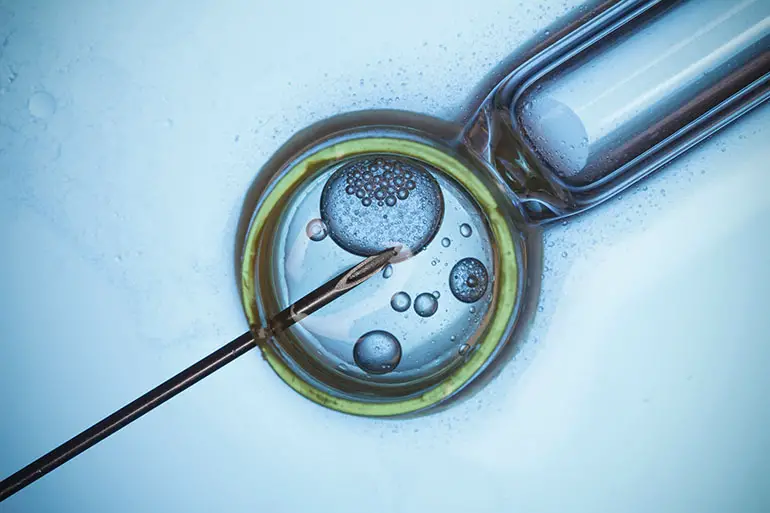From stripping to living out of a van, students and recent graduates alike have been known to resort to unconventional methods of making money in order to pay their tuition.
One option an increasing number of grads and undergrads are exploring to help alleviate some of their financial burden is egg donation. First implemented in the 80s, egg donation is defined as “the process by which a fertile female provides one or several eggs (also known as ova or oocytes) to an infertile woman for purposes of assisted reproduction.”
If an individual applies to be a donor, is accepted and eventually chosen by a couple, they will typically receive between $5,000 and $10,000 as compensation.

The major criteria for becoming an egg donor are age (must be 21-30 years old), overall health and accomplishment. College students are the ideal egg donors; they’re young, educated and they could probably use the money. In fact, they’re often specifically targeted by the fertility industry. I first heard of egg donation when I spotted fliers like these pinned on bulletin boards all over my university’s campus.
If your curiosity has been captured, or you’re a student who’s already been contemplating doling out some of their sex cells, here’s a collection pros and cons to consider.
Pros
To many women, the most alluring aspect of egg donation is being able to help an unproductive couple conceive a child. The number of individuals choosing the childfree lifestyle is on the rise, and many of those people feel that if they aren’t going to be putting their eggs to use, they might as well give them to someone who will. There are also plenty of folks who do desire dependents of their own, and simply want to help ensure that others have the same opportunity.
And, of course, there’s also the robust lump sum that you’re handed once your reproductive cells have been retrieved. The average compensation of $8,000 for human gamete benefaction is enough to make a considerable dent in any student’s tuition. Students have also used ovum contribution cash to cover expenses such as studying abroad or a year’s worth of rent.
At this point, you may be wondering why it’s called egg “donation” when the individual providing the eggs is receiving so much money. The process is considered donation because, technically, you aren’t being paid for the eggs themselves. The hefty amount of green is meant to be compensation for your time, work and discomfort.
Furthermore, I’d imagine that being selected to be a donor would be a bit of a confidence booster. It would be sort of neat to know that when a couple sat down and flipped through actual binders full of women, they looked at your mug and thought, “I’d be chill with my kid looking like them.” In a weird way, it’s kind of like the ultimate compliment.
Cons
There are several components of egg donation that are decidedly unpleasant and render the procedure infeasible for many undergrads.
The first downside to being a donor is the significant amount of time and work that you’ll need to put in, during both the application process and the actual exchange of ova. Many college students might not have the time to spend countless hours filling out mountains of paperwork and undergoing extensive physical and psychological evaluations.
If an applicant is deemed worthy of sharing their genetic material, they’ll just have to hang out until some baby-seeking unit out there decides they’d like snatch it up. It’s entirely possible that you could go through all of the effort of certifying your gametes only to have no one ever want them.
If you are selected to donate, you’ll have to endure several weeks (exact timeline depends on multiple factors) of medication, including birth control and self-administered hormone injections. The actual act of egg retrieval, called harvesting (creepy), is a surgical procedure that requires local anesthesia.
This process inevitably involves multiple periods of pain and impaired function, which definitely isn’t an ideal situation for a full-time student. If a student was picked to donate in the middle of the semester, they might have a hell of a time trying to balance their education and the demanding transference of life-creating material. It’s also worth noting that the toll that the donation process takes on the contributor is often mental as well as physical.
Right now, you might not even be able to think about what you’ll be doing after your next big exam, much less about popping out a few bundles of joy five or so years down the line.
However, if you’ve got your shit together enough to give serious consideration to parenthood, it might bother you that it’s essentially unknown whether or not egg extraction affects future fertility. There are loads of donors who have gone on to successfully have babies. On the other hand, there is a small percentage that has experienced complications such as ovarian hyper stimulation syndrome.
As expected, there is somewhat of a stigma surrounding oocyte bestowal. Unfortunately, while sperm donation is considered socially acceptable, egg donation isn’t quite there yet. A lot of people, who may happen to be the family members, friends and partners of egg donors, are uncomfortable with the idea.
Other Considerations
Although, in theory, you’re being compensated for the egg donation process and not the genetic material itself, it’s quite apparent that not all oocytes are seen as equal. The rate of payment is a range, not only because the procedure could differ between individuals, but also because prospective parents are often willing to pay more for certain donor attributes.
Where you go to school is especially important — Harvard eggs are more valuable than state school eggs. When doing research, I even came across ads like “Ivy League Egg Donors” and “Genius Asian Eggs Wanted.”
If you’d like to learn about the process from people who have actually gone through with it, there are plenty of personal accounts detailing both negative and positive experiences with egg donation.
There’s even a documentary created by the Center for Bioethics and Culture called “Eggsploitation,” which claims to expose the seedy underbelly of the infertility industry.
Ultimately, the best way to discern whether or not egg donation is right for you is to find out everything you can about the procedure. Treat it as though it’s the subject of that final research paper that’s worth 50 percent of your grade.
The majority of people who ended up regretting their decision to donate admitted that they were unhappy largely because they jumped into the process without fully understanding it.
As students, I’m sure you all can affirm that just doing your homework is the best solution in most situations.










Thanks to Josephine for a thoughtful, balanced piece. Your conclusion is spot on–due diligence is paramount when considering being an egg donor.
I’ve donated my eggs several times and am preparing for another round in January. I’d like to share my experiences to give prospective donors some perspective on the process, and rebuff some of the claims made here.
A bit about me: I am a recent graduate, but I have little debt and a good job. Anything for money is exploitative in some way. It’s a tradeoff; for example stressful and dangerous jobs often pay more. Also, the agencies I’ve gone through aren’t targeting impoverished women or anything. In fact, they do not want this to be a primary source of income or a ‘last resort’ for desperate women. The agencies I worked through were very clear about this and did not want to risk their reputations. So I believe comparing egg donation to stripping is stretching the truth.
I disagree with the claim of ‘mountains of paperwork.’ Really it takes a few hours; there is an initial health history of you and your family. If you’re accepted, there’s a psychological screen (1h online/phone), legal advice (30′ phone or in person, often at the main facility), medication consult (30′ in person).
If you make it through all of this, the medical screens (transvaginal ultrasounds and blood hormone levels) take about 20 minutes each. These continue through hormonal stimulation and egg retrieval, and once after to confirm post-stimulation levels are normal.
One thing that is not mentioned here is that the agencies, in my experience, are very selective with donors. Roughly 90% of applicants are dropped following initial screens. Beyond that, many donors aren’t chosen after all this screening. I was lucky to be ‘in demand’ but know some donors that were never selected.
The way intended parents/recipients choose their donor is like an online catalog. Each donor has a profile with pictures (supposedly anonymous), academic achievements, and other characteristics like athleticism or musical talent. Morally, the waters get a bit muddy here (something something designer babies). Unfortunately, if you’re healthy but unattractive and have few ‘on paper’ credentials, you’re unlikely to be picked.
Another thing–positive here–that isn’t mentioned is the free genetic screening and free reproductive healthcare you get as a donor. I now know I am not a carrier for many heritable diseases and my ovaries look pretty good, which helps my future baby planning and saves me lots of $$. You’re also screened for thyroid problems and STDs a couple times, for free.
Overall I was highly satisfied with my experiences as an egg donor. For me, the process was quick and painless. At most, slightly uncomfortable. The recipient parents often send you notes of appreciation, which are really special. The agency I’m working with for the upcoming donation will notify me upon successful pregnancy and birth, which I am really looking forward to.
[…] best to understand that universities aren’t as financially accessible as one would like. Free college, per se, does not exist, but, there are always ways to find people […]
[…] best to understand that universities aren’t as financially accessible as one would like. Free college, per se, does not exist, but, there are always ways to find people […]